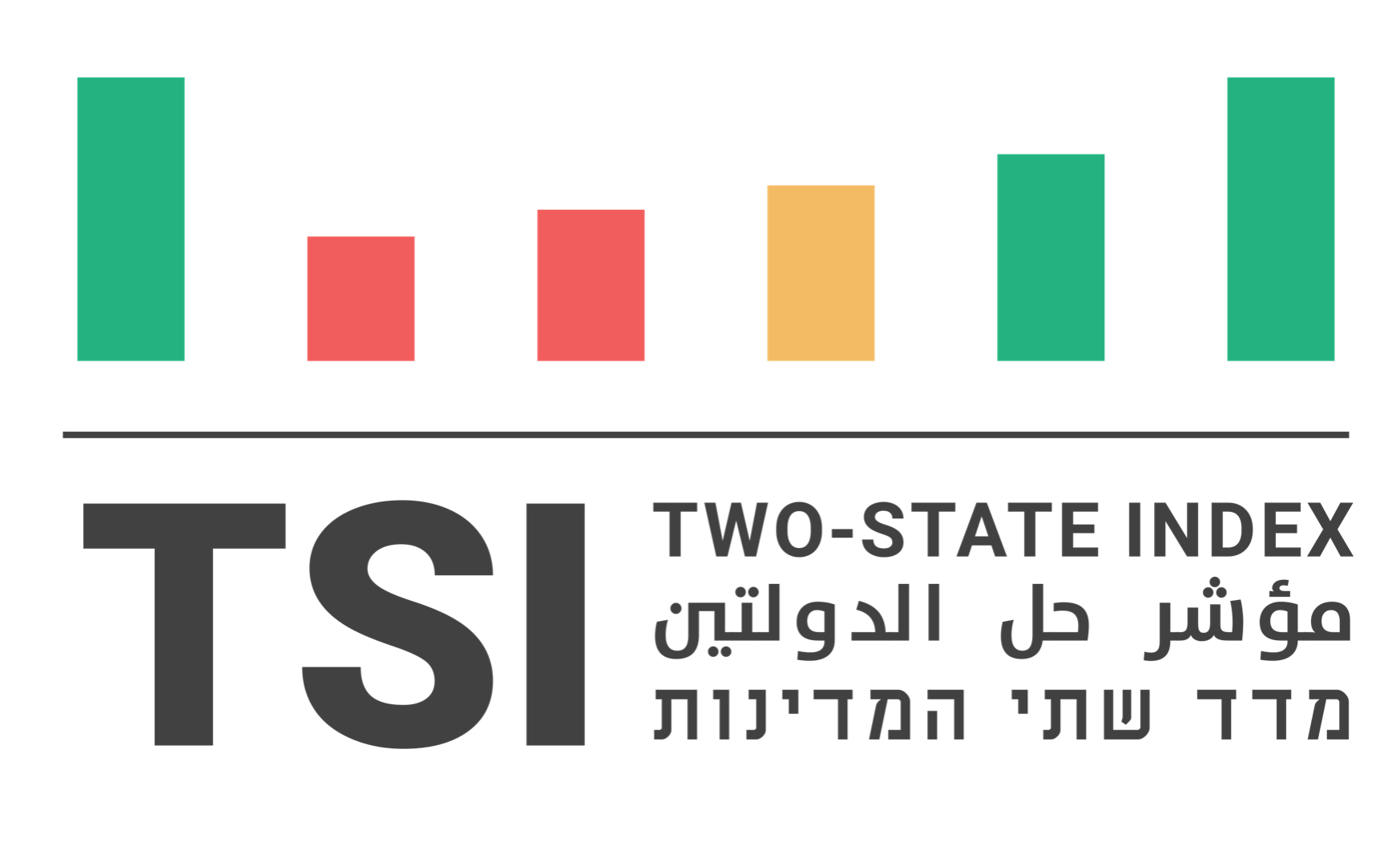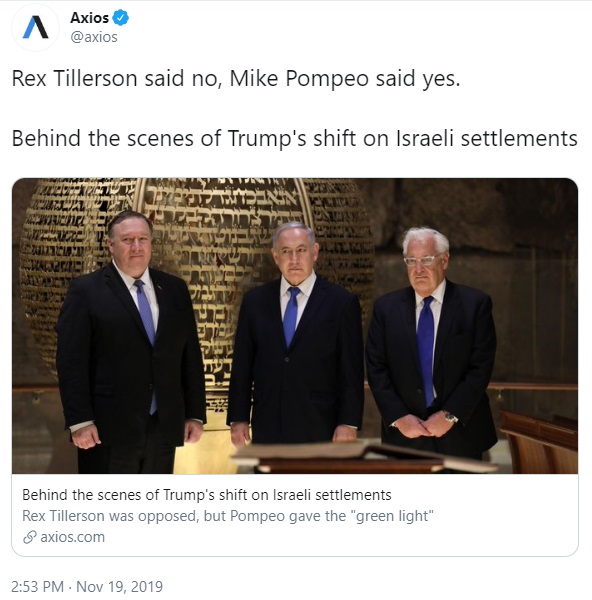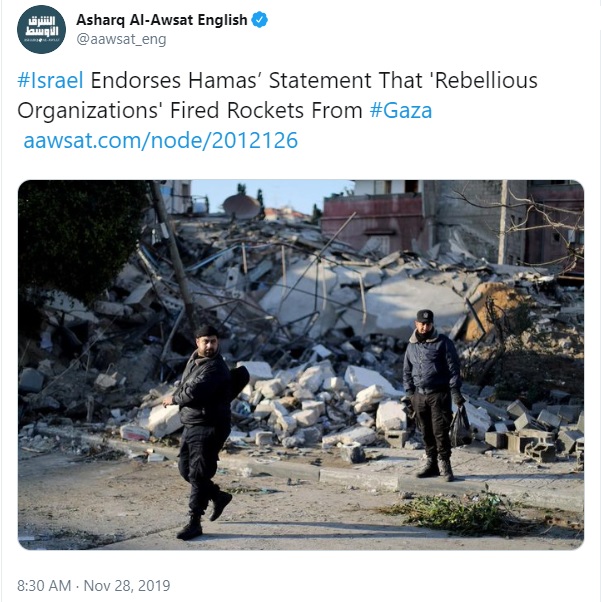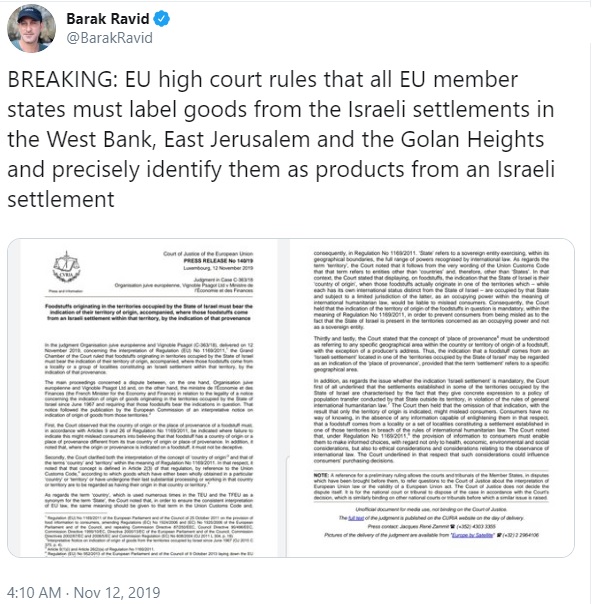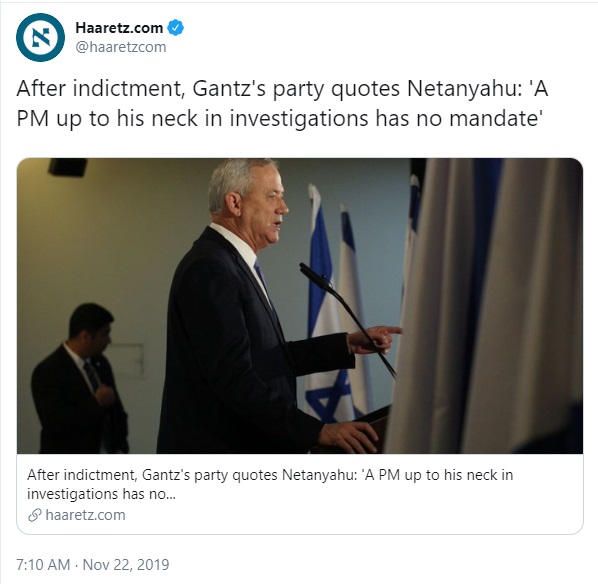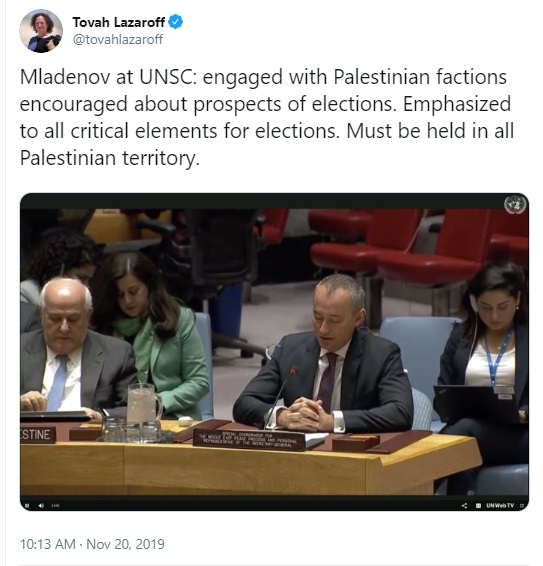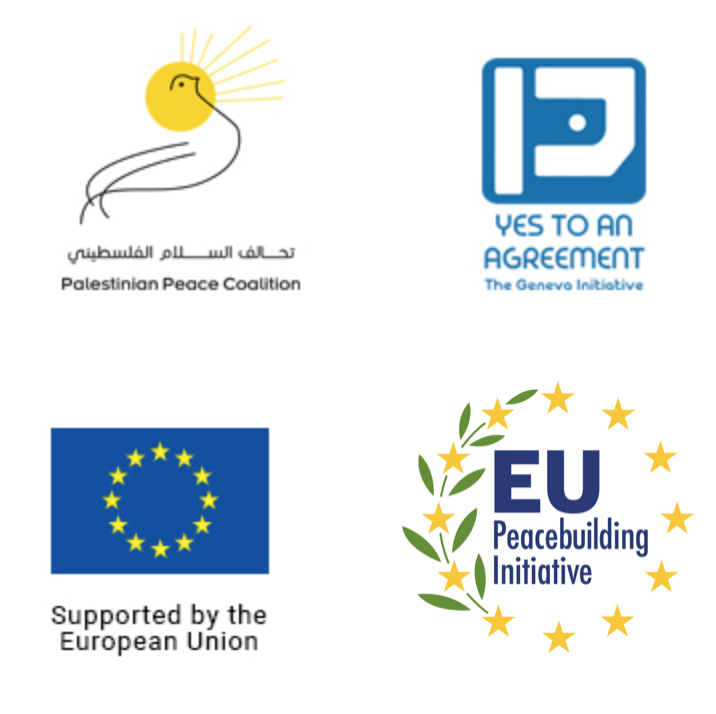November, in short: - Trump administration announces change in approach to settlements: Pompeo says US will no longer regard Israeli settlements in the West Bank as “inconsistent with international law”
- New round of fighting between Israel and Islamic Jihad: Killing of PIJ commander leads to outbreak of rocket-fire and airstrikes, with Hamas sitting on the sidelines
- European Court of Justice issues ruling on settlement products: Decision to require labeling pushes back against efforts to conflate Israel and the Occupied Territories
- Israel heads toward third election in past year: Gantz fails to form a government while Netanyahu is indicted on three charges
- Palestinians make incremental moves toward elections: Significant obstacles remain, despite ostensible support from all Palestinian factions
These events moved the Two-State Index (TSI) up by 0.2% (up by 0.01 points from 5.55 in previous month). |
|
|
|
To learn about the Geneva Initiative's TSI, visit our website. |
|
|
|
Trump administration on settlements – new statement, old policy
US Secretary of State Mike Pompeo announced on November 18 that the US would no longer regard Israeli settlements as “inconsistent with international law”, overturning the 1978 State Department opinion that defined them as such. The decision was praised and welcomed by both PM Netanyahu and Blue and White leader Benny Gantz, while the PLO said that the “horrific” action “sends a clear signal that [the Trump administration has] total disregard for international law.” The UN and EU both reemphasized their positions that settlements are illegal. The Arab League firmly rejected the move, while the UN and EU both reemphasized their positions that settlements are illegal, with EU High Representative Federica Mogherini subsequently warning that settlements “threaten to make a two-state solution impossible.”
The statement does not change the legal status of the settlements (defined as illegal by the Fourth Geneva Convention), the situation on the ground or the actual policy of the current administration that allows Israel to expand settlements. The statement also did not describe settlements as obstacles to peace, as they had been defined under previous administrations. The administration thus drifted further from potentially supporting any peace plan that would plausibly result in a two-state outcome.
The Trump administration’s decision, overturning four decades of precedent by adopting a conciliatory policy on settlements, shifted the parameter related to US support for a two-state solution from 4 to 3.
|
|
|
|
Israel and Islamic Jihad trade fire after killing
A new round of rocket fire from Gaza was sparked by Israel’s killing of Palestinian Islamic Jihad (PIJ) commander Baha Abu al-Ata on the night of November 12. Ata, the head of PIJ’s northern branch in Gaza, was responsible for recent rocket launches against Israel in October, and PM Netanyahu claimed that he was planning to launch new attacks imminently. During the tit-for-that exchanges of rocket fire and Israeli airstrikes that ensued, 35 Palestinians were killed, 24 of whom were militants. In one instance, nine civilians were killed in a bombing that Israel called a mistake. Some 500 rockets were launched into Israel, shutting down much of southern and central Israel for two days, but they did not lead to any Israeli casualties.
A notable element of the fighting was the decision by Hamas to not enter the fray (notwithstanding two missiles launched on November 16, which the IDF publicly attributed to rogue elements), and Israel’s decision to differentiate between Hamas and PIJ targets. In the past, Israel has usually held Hamas responsible for any rocket fire from Gaza, and has bombed Hamas targets in retaliation for attacks perpetrated by other groups.
Celine Touboul, Co-Director General of the Economic Cooperation Foundation, said that Ata was considered “a problem for Hamas as well as Israel”, whose continual violations of truce arrangements threatened to drag Israel and Hamas into further confrontation. Touboul maintained that the targeting of PIJ increased the perception of the group as “a player” challenging Israel and “made Hamas into a collaborator” in the eyes of many Palestinians, possibly increasing PIJ’s popularity at Hamas’ expense. While PIJ’s military capacity has now been weakened, “the ability for Hamas to contain them will forever diminish” if Hamas is not able to reap tangible gains from its arrangements with Israel.
The relationship of tacit cooperation between Israel and Hamas has now been further strengthened – with senior Hamas official Basem Naim reportedly citing “the Palestinian interest” as reason for the group to avoid an escalation with Israel – along with the division between the ruling Palestinian entities in Gaza and the West Bank.
Therefore, the parameter related to prospects for war in Gaza moved from 6 to 5 in November.
|
|
|
|
EU court rules that settlement products must include origin on labels
On November 12, the European Court of Justice ruled that EU states are obliged to identify products from Israeli settlements by marking their origin on the label. In a statement, the court said that consumers must be allowed to make informed choices relating "not only to health, economic, environmental and social considerations, but also to ethical considerations," and adherence to international law.
The ruling was a positive development for prospects for a two-state solution, one that further differentiates between Israel and settlements across the Green Line in the West Bank. In the opinion of Dr. Nimrod Goren, head of the Mitvim institute, the decision “consolidated the traditional European vision” on differentiating products from settlements, and may prove an “external catalyst” for responding to Trump administration efforts to normalize settlements.
By providing a stark reminder to Israelis of the prevailing view in the international community that settlements are not part of Israel, and increasing debate and awareness related to Israel’s borders, the court’s decision shifted the relevant parameter from 4 to 5.
|
|
|
|
Israel likely headed to third election with Netanyahu now under indictment
There were major developments on the Israeli domestic political scene in November, which remained paralyzed. On November 20, Blue and White leader Benny Gantz conceded his failure to form a government, giving the Knesset 21 more days to avert a third election. Only days later, PM Netanyahu was indicted on charges of fraud, bribery, and breach of trust. With Likud maintaining support for Netanyahu and Blue and White having sworn not to serve with an indicted prime minister, chances for a unity government remained low.
With no government in place or likely to be formed soon, the Israeli-Palestinian peace process remains in deep freeze. The relevant parameters therefore remained the same in November.
|
|
|
|
Continued progress toward Palestinian elections, but obstacles remain
There were more steps taken in November toward new Palestinian elections. Hamas agreed to President Abbas’ plan for elections, and consented to holding a national meeting of Palestinian faction leaders – all of whom have now agreed to hold elections – only after President Abbas issues a presidential decree officially announcing and outlining terms for the elections, but the group has also demanded the reactivation of the Palestinian Legislative Council (PLC), which has been suspended since 2007. Meanwhile, UN special representative Mladenov reportedly committed to assisting with elections.
Earlier in November, Abbas delivered a memo to be signed by all Palestinian factions in the West Bank and Gaza, committing them to the 2007 election law and to holding elections in East Jerusalem. The latter issue remains a stumbling block; it is still unclear whether Israel will allow East Jerusalem to be included. But Abbas and Hamas have declared that there will be no elections without the participation of East Jerusalem Palestinians.
Prospects for Palestinian elections are still far from certain, thus the relevant parameter remained the same in November.
|
|
|
|
The Two-State Index (TSI) is brought to you by the Geneva Initiative, a Palestinian-Israeli organization working to promote a negotiated peace agreement in the spirit of the two-state vision. The TSI is produced by an Israeli-Palestinian team, and reflects a unique bilateral perspective. |
|
|
|
Think we missed something this month? Send us tips and comments here. |
|
|
|
This publication was produced with the financial support of the European Union. Its contents are the sole responsibility of the Geneva Initiative’s Two-State Index (TSI) editorial team and do not necessarily reflect the views of the European Union. |
|
|
|
|
|
|
| Advertisement |
This message was sent byTwo-State Index, H.L. Education for Peace, Geneva Initiative, 33 Jabotinsky rd., Ramat-Gan 525108, Israel, .
You may notify us, any time, for no charge, of your refusal to receive advertisements by sending a refusal message to the address TSI@genevainitiative.org
or by pressing the "unsubscribe" link at the bottom of the message. |
Powered by Publicators
Powered by Publicators
